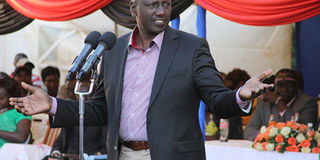ICC allows Ruto to seek acquittal from charges

PHOTO | JARED NYATAYA Deputy President William Ruto speaking during a past function. ICC judges have allowed him to seek his acquittal when the Prosecution concludes its case by filing ‘no case to answer ‘motion
What you need to know:
- Judges Chile Eboe-Osuji, Olga Herrera Carbuccia and Rober Fremr gave the defence teams for Mr Ruto and Mr Sang 14 days to file the motion after Prosecutor Fatou Bensouda concludes her case against the two.
- In June last year, the judges ordered the defence lawyers, the prosecution and the victims lawyer to file their submissions on whether the Trial Chamber should allow the motion that will seek to acquit Mr Ruto and Mr Sang of the charges of crimes against humanity after Ms Bensouda’s concludes giving her evidence.
Deputy President William Ruto will be allowed to seek for his acquittal from the charges he faces at The Hague when the prosecution concludes its case.
The ruling, by Trial Chamber judges, gave Mr Ruto the hopes of being freed from the case which has forced him to make several trips to the International Criminal Court in Netherlands to appear in person.
His defence, the prosecution and the victims representative were in agreement that a motion of no case to answer can be filed at the end of the prosecution case against Mr Ruto and former radio journalist Joshua Sang which has been on going—with intermittent breaks—since September last year.
Judges Chile Eboe-Osuji, Olga Herrera Carbuccia and Rober Fremr gave the defence teams for Mr Ruto and Mr Sang 14 days to file the motion after Prosecutor Fatou Bensouda concludes her case against the two.
“The Chamber therefore directs the Defence to notify the Chamber orally no later than the last day of the Prosecution’s case - or completion of the presentation of any evidence by the Legal Representative or as requested by the Chamber, as applicable - of their intention to file 'no case to answer’ motions, if any. Any such 'no case to answer’ motion shall be filed no later than 14 days after said day,” they ruled Tuesday.
In June last year, the judges ordered the defence lawyers, the prosecution and the victims lawyer to file their submissions on whether the Trial Chamber should allow the motion that will seek to acquit Mr Ruto and Mr Sang of the charges of crimes against humanity after Ms Bensouda’s concludes giving her evidence.
All were in agreement that the motion can be filed at the end of the prosecution case but Mr Ruto’s lawyer, Mr Karim Khan, stated that it could be entered either earlier or even after the defence starts its giving its evidence.
While the legal teams for the deputy president and Mr Sang wanted the motion to include all counts facing their clients, Ms Bensouda argued that it should focus on each count they face.
The suspects are accused of murder, eviction of civilians from their homes and persecution arising from the 2007/8 post election violence.
“By paring away charges which are found not to be sufficiently supported by evidence after the conclusion of the presentation of evidence by the Prosecution, a 'no case to answer’ motion has the potential to contribute to a shorter and more focused trial, thereby providing a means to achieve greater judicial economy and efficiency in a manner which promotes the proper administration of justice and the rights of an accused,” the judges said.
The judges argued that the motion is meant to protect both Mr Ruto and Mr Sang from being required to answer to charges when the prosecution has inadequate evidence to justify the case. The legal teams for two have argued that the Ms Bensouda’s evidence against their clients was insufficient, defective and “cooked up” by witnesses who cannot be trusted. Mr Sang is represented by lawyer Katwa Kigen.
“The primary rationale underpinning the hearing of a 'no case to answer’ motion - or, in effect, a motion for a judgment of (partial) acquittal - is the principle that an accused should not be called upon to answer a charge when the evidence presented by the Prosecution is substantively insufficient to engage the need for the defence to mount a defence case,” the judges explained.
The judges directed that the motion should not exceed 40 pages and must specify the particular counts which the defence wants challenged. The prosecution and the victims lawyer will also 14 days after filing of the motion to submit their positions on the issues raised.




